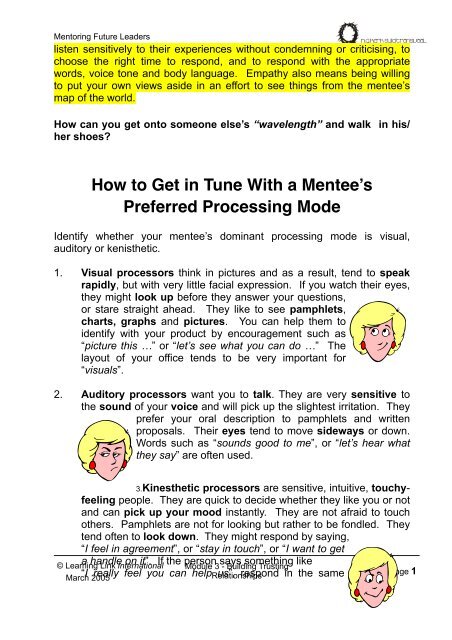Mentoring Future Leaders
You also want an ePaper? Increase the reach of your titles
YUMPU automatically turns print PDFs into web optimized ePapers that Google loves.
<strong>Mentoring</strong> <strong>Future</strong> <strong>Leaders</strong><br />
listen sensitively to their experiences without condemning or criticising, to<br />
choose the right time to respond, and to respond with the appropriate<br />
words, voice tone and body language. Empathy also means being willing<br />
to put your own views aside in an effort to see things from the mentee’s<br />
map of the world.<br />
How can you get onto someone else’s “wavelength” and walk in his/<br />
her shoes?<br />
© Learning Link International<strong> </strong><br />
March 2005<br />
How to Get in Tune With a Mentee’s <strong> </strong><br />
Preferred Processing Mode<br />
Identify whether your mentee’s dominant processing mode is visual,<br />
auditory or kenisthetic.<br />
1. Visual processors think in pictures and as a result, tend to speak<br />
rapidly, but with very little facial expression. If you watch their eyes,<br />
they might look up before they answer your questions,<br />
or stare straight ahead. They like to see pamphlets,<br />
charts, graphs and pictures. You can help them to<br />
identify with your product by encouragement such as<br />
“picture this …” or “let’s see what you can do …” The<br />
layout of your office tends to be very important for<br />
“visuals”.<br />
2. Auditory processors want you to talk. They are very sensitive to<br />
the sound of your voice and will pick up the slightest irritation. They<br />
prefer your oral description to pamphlets and written<br />
proposals. Their eyes tend to move sideways or down.<br />
Words such as “sounds good to me”, or “let’s hear what<br />
they say” are often used.<br />
3.Kinesthetic processors are sensitive, intuitive, touchyfeeling<br />
people. They are quick to decide whether they like you or not<br />
and can pick up your mood instantly. They are not afraid to touch<br />
others. Pamphlets are not for looking but rather to be fondled. They<br />
tend often to look down. They might respond by saying, <strong> </strong><br />
“I feel in agreement”, or “stay in touch”, or “I want to get<br />
a handle on it”. If the person says something like <strong> </strong><br />
“I really feel you can help us”, respond in the same<br />
Module 3 - Building Trusting <strong> </strong><br />
Relationships<br />
Page !1




